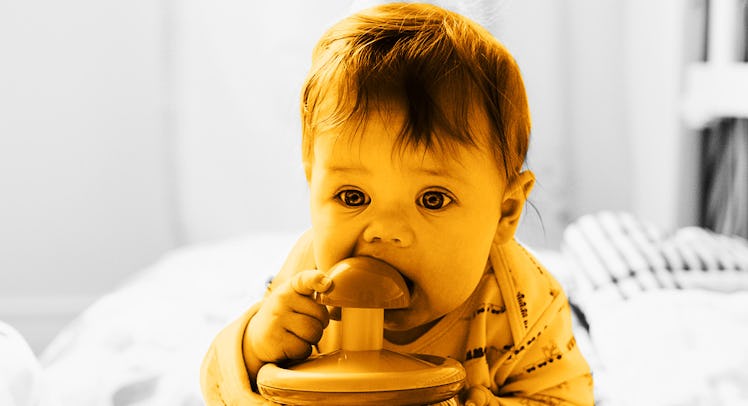Baby Teething: From Teething Charts To Teething Symptoms
Baby teething doesn't have to be mysterious. Parents can cut through misinformation by finding a pediatric dentist at the first baby teething symptoms.

Baby teething is a significant milestone — with a gradual timeline and teething symptoms that can be hard to read at first. When parents find their baby to be particularly drooly or fussy, it’s probably time to ask “when do babies start teething?” Baby teething symptoms are said to include a host of changes in demeanor, attitude, temperature, skin condition, and even bowel movements. Which is to say baby teething is incredibly stressful for parents who are happy to blame it for all of their struggles. The perceived peril at the onset of baby teething has inspired an entire industry built around baby teething remedies and teething toys — offering varying degrees of efficacy. Every parent deals with the teething process, and many are happy to share anecdotal evidence to support one approach or another. But Dr. Sean Boynes is a National Children’s Oral Health Foundation Dentist of Distinction and has medical science on his side.
“When your child begins teething, the most important thing you can do at this time establishes a dental home,” he advises. “Preventive care is key when it comes to oral health, which is why we recommend babies see a dentist when the first tooth appears. It also gives you and the dentist a chance to develop an ongoing relationship and personalized care to ensure there are no signs of particular concern.”
Quick Guide for Parents With Teething Babies
- Teething makes a baby cranky, not sick: there’s no evidence that fevers or diarrhea are caused by teething, but it can make babies irritable.
- Even the first tooth needs a dentist: baby teeth are temporary, but they are still important. Parents should establish a dental home when the first tooth appears.
- Chewing works best: there are a number of remedies for teething pain, but just letting the kids chomp down on a wet washcloth is best. Some remedies, like gels that contain benzocaine, may be dangerous.
- The later the tooth, the tougher it is: the first few teeth are sharp and erupt easily; later, flatter teeth are more painful and harder to relieve due to their position.
- Tooth care is for life: teething will end, but oral hygiene doesn’t. Good habits in childhood will carry through adulthood.
Baby teething gets blamed for more issues than it causes, but it can still be pretty uncomfortable. “It is very important for parents to learn to recognize normal timing and symptoms of teething,” says Boynes. “It might be the reason your baby is fussy, drooling excessively, particularly irritable, interested in chewing on hard items, or has tender and swollen gums.”
Baby Teething Charts and Order of Eruption
Baby teeth, milk teeth, primary teeth, deciduous teeth – all these terms refer to the same thing. The first few chompers to appear are the lower incisors (the bottom two front teeth) that emerge as early as four months. They are not particularly dramatic, because they are very sharp and erupt easily, and they are cute as hell because babies are starting to get good at smiling. Then come the top two front teeth.
The remaining teeth emerge from front to back. The specific timing is determined by genetics, but by age three most kids will have the full set. All in all, parents can expect two and a half years of low-key irritability and unreliable sleep.
How to Treat Baby Teething Symptoms
There are many numbers of teething relief products lining the pharmacy shelves, but a recent FDA consumer update should give any parent pause about over-the-counter treatments containing benzocaine. The most straightforward (and probably most effective) is just to let them chew, says Boynes. They’re going to chomp anyway, so parents might as well give them something appropriate to chew on.
“You can wet and wring a clean washcloth, place it in the refrigerator or freezer to chill, then let your baby chew on it,” says Boynes. “The cold helps soothe the pain, too. You can also massage your baby’s gums and provide them with safe chewing toys.”
How to Care for Baby Teeth
Teething is a process that does eventually end, but dental care doesn’t. Baby teeth are temporary, but they come in at developmentally important times. They emerge in time for the baby to start solid foods. They are crucial to proper speech development. And they last longer than parents may think, so cavities or other problems shouldn’t just be shrugged off.
“Caring for baby teeth means caring for your child’s teeth until they are age 11 or 12, which would be a long time for anyone to live with health issues associated with tooth decay,” says Boynes. “Once teeth emerge, parents should begin brushing twice daily using a small dab of fluoridated toothpaste and a soft toothbrush with a small head. Losing baby teeth too early can actually impact the development of permanent teeth.”
This article was originally published on